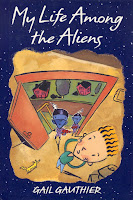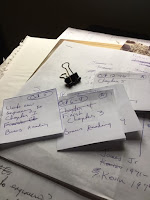Here it is, the
recapitulation
post, in which I go over my professional goals and objectives for the
year, determining what worked and what didn't, what I want to continue
doing, what I want to change. This will set me up for planning next
year's goals and objectives, which will go up next week.
Consider doing some recapitulation, folks. It's incredibly helpful, and you may find it an ego-boost, too. You could have accomplished more than you think you have. Especially if you had goals to work with last year. They were a huge help for me, giving me something to focus on.
My greatest accomplishment in 2020 is, of course, remaining on my feet and as sane as I ever am. Professionally, though, here are my goals and objectives and what happened with them.
Goal 1. Concentrate on submitting completed book-length projects as well as completed short-form work.
Objectives:
- Submit adult book to agents researched this fall Yeah, I did some of that. Six submissions of one book, anyway.
- Continue researching agents for adult book, through Publishers' Marketplace, Twitter, etc. Ah...
- At some point in year, switch submission focus to my second adult book Well...
- At some point in year, switch submission focus to my children's books Not in an organized way.
- Spend more time with essay Facebook group. Those people are
publishing and share their work, exposing me to new markets. Which is
not stalking them. Nope, I didn't do that.
- Seek out markets for a seasonal essay I wrote last fall. May have made a few feeble attempts.
- Check the publication history of some essayists I read last year. Don't know what this was about.
However, I did make 50 submissions overall this year, resulting in publishing the following:
Fears That We May Cease To Be at The Blue Nib Literary Magazine
Dear Pastor Bill at The Haven
And I published the humor piece Well, How Many Masks Have You Made at Medium myself.
That was some progress with my short-form adult writing.
Goal 2.
Work on short-form writing, essays and short stories.
Objectives:
- Start some eating essays I did a micro piece about shell macaroni and maybe something else.
- Choose an essay or short story from the files or journal to do a little work on every week Nope
- Plan to focus short-form reading on different genres each month Did do that for a while
- Spend the last week of every month completing something. Anything. Nope
However, I took a six-week flash forms workshop this summer during which I wrote some pieces and then last month took part in Flash NaNo2020 during which I wrote nine more pieces. One of them was Dear Pastor Bill, which has already been published. So though I didn't do much with the planned objectives, I am happy what I did for the overall goal.
Goal 3. Work on the 365 story project
Objectives:
- Focus on this as short-form writing (see Goal 2)
- January reading focus will be flash fiction Yes
- Spend time reading short stories, shorter work in children's literature Nope
- Take drafts to writers' group What writers' group? It's 2020.
I did absolutely nothing on this and was planning to ditch it again for next year. However, just this morning I was thinking that now that I have more flash training, I should dabble with this again.
Goal 4.
Work on YA thriller that could become an adult thriller
Objectives:
- Work on history background for Character 2 during January and February Yes
- Work on Character 3 Yes
- Work on blueprinting. Yes
- Just work on scenes. Don't worry about connecting things. Not so much
- Read YA thrillers. Don't think I stumbled upon many of those this year.
- Develop a theme Yes
I did a lot with this, and it will be a focus for next year.
Goal 5. Community Building/General Marketing/Branding
Objectives:
- Provide social media support for writers/bloggers generating diversity material. I found a nice mix of diverse writers publishing this year and was able to include them in my 2020 monthly books publishing posts.
- Continue with writers' group. No.
- Pay more attention to community events like Multi-Cultural Children's Book Day That fell apart, because I was spending so much time on the monthly publishing posts.
- Continue with Original Content. Yes.
- Check out NESCBWI spring conference, with possibility of attending. Yes, but didn't attend the on-line conference. Did take 2 or 3 of the on-line workshops it offered for members this year.
- Check out NESCBWI-PAL offerings this year, with possibility of attending. There were some regional on-line gatherings, but I didn't go.
- Be open to attending events for writers of adult literature. Took that flash forms workshop mentioned above and attended a couple of salons.
- Attend other authors' appearances. Went to 2 virtual book launches.
- Continue with promoting Original Content at Facebook communities, Goodreads' blog, and Twitter. Yes.
Goal 6. Stay On Top Of Upcoming Known Events
Objectives:
- Do more planning for the year/particular months Yeah, that fell apart. For one thing, I forgot to check the monthly section of my bullet journal on this.
- Check in with goals at the end of each month No
- Expect the end of the year to be a disaster Yes. Other parts of the year, too.
Goal 7. Continue collecting material and ideas for an adult scifi project, far in my future.
Funny story on this one. The adult scifi project I was thinking about was called Flu Season, and it was going to be a mystery/thriller set in a world that has recovered from a massive flu epidemic that took out a big percentage of the population a couple of generations back. The flu has never been wiped out, and people have learned to live around it. In addition, the world's population hasn't bounced back, so the world hasn't bounced back, so that makes for a different--though not necessarily bad--kind of life.
I had a lot to work out with this and hadn't started any writing. But I was thinking about world building. I was thinking about a world where everyone wears masks and gloves in public and makes fashion statements with them. Homes are renovated so people enter through laundry rooms where they strip out of their outdoor clothes and change into clean clothes. Everyone home schools. Takeout meals are a big, fancy deal.
Now, I'm not going to go anywhere with this now, but the thinking I'd done with it had an impact on how I've lived the last 9 months, and probably why, psychologically, I've dealt with this better than I might have. I was somewhat prepared.
















































